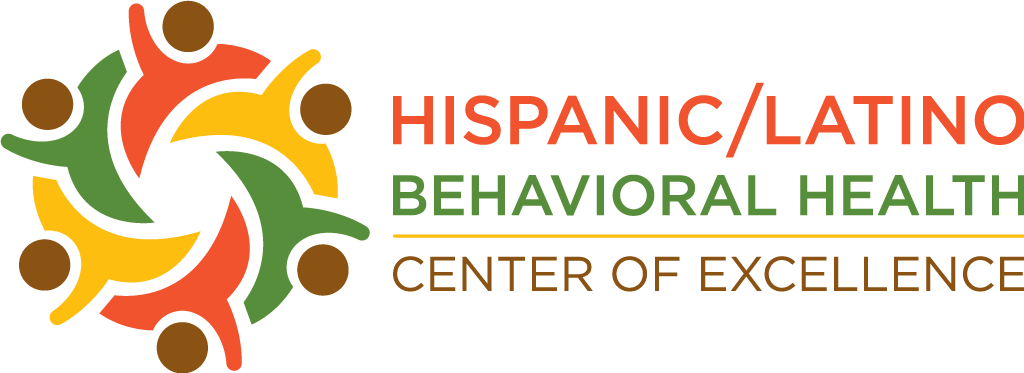
At Hispanic/Latino Behavioral Health Center of Excellence , we are committed to providing instructive resource materials and guidelines. These products are invaluable for providers, trainers, trainees, and students involved in mental and behavioral health practices. Our goal is to empower professionals with the knowledge and tools they need to offer culturally sensitive care to Hispanic and Latine communities.
We are thrilled to provide products created or collaborated by the Hispanic/Latino Behavioral Health Center of Excellence - Coming Soon...
Latines and Suicide Prevention Resource Guide
Embedding Equity and Building the Suicide Prevention Workforce for Underserved Communities Technical Experts Panel
The Latine LGBTQ+ community encompasses a diverse range of identities, experiences, and cultures. Concurrently, Latine LGBTQ+ individuals often face intersectional discrimination related to their ethnic, gender, and sexual identities, resulting in added stressors and increased risks of mental health challenges, including substance use, depression, and suicide.
This panel discussed disparities among Latine LGBTQ+ individuals and emphasized the importance of adopting a multifaceted approach that acknowledges the intersections of identity, culture, and social determinants of health. Experts in the field discussed perspectives and approaches on how providers and community-based organizations can implement culturally sensitive and responsive care practices that are attuned to the strengths, contexts, and experiences of Latine LGBTQ+ communities and seek to advance behavioral health equity.
Speakers:
David Zelaya, Ph.D.
Carlos A. O. Pavão, DrPH, MPA
Alison Cerezo, Ph.D.
Moderator:
Miguel Vázquez, Psy.D.
While motherhood is culturally perceived as a ‘happy’ period in life, there are several mental health conditions that may present during pregnancy and postpartum. These are identified under the term Perinatal Mood and Anxiety disorders (PMADs). Up to 1 in 5 women will suffer from a mental health disorder like postpartum depression and less than 15% will receive treatment. Given the social determinants of health affecting Latinx, they may be at a higher risk for developing symptoms. PMADs have an adverse effect on mothers, fathers/partners, mother–infant interactions, and infant outcomes, which makes early detection and treatment essential for the overall well-being of families.
Objectives
Presenter: Marianela Rodríguez, PhD, PMH-C
___
Si bien la maternidad se percibe culturalmente como un período "feliz" en la vida, existen varias condiciones de salud mental que pueden presentarse durante el embarazo y el posparto. Estos se identifican bajo el término Trastornos Perinatales del Estado de Ánimo y la Ansiedad (PMAD, por sus siglas en inglés). La data indica que 1 de cada 5 mujeres sufrirá un trastorno de salud mental como la depresión posparto y menos del 15% recibirá tratamiento. Considerando los determinantes sociales de la salud que afectan a los latines, puede haber un mayor riesgo de desarrollar síntomas en comunidades latines. Los PMAD tienen un efecto adverso en las madres, los padres/parejas, las interacciones madre-hijo y los el desarrollo infantil, lo que hace que la detección temprana y el tratamiento sean esenciales para el bienestar general de las familias.
Objetivos
Presentadora: Marianela Rodríguez, PhD, PMH-C
Nurturing Mentoring Relationships among Hispanic and Latine Behavioral Health Trainees and Providers- Q&A Sessio
Closed Captions available in English.
Presentation slides.
This training explored the development of disparities in the US and their impacts on marginalized and racialized communities. Utilizing a social justice framework the participants will learn about building health
equity, cultural humility, and community engagement. This training centered the Enhanced CLAS Standards, Cultural Self-Assessments and other tools designed to improve services and eliminate health
Disparities.
In this presentation, participants will explore the intricate landscape of teenage dating violence within Hispanic and Latine communities. Attendees will uncover the cultural nuances that influence relationship dynamics, including traditional values and gender roles. Throughout the session, participants will learn to recognize warning signs, both behavioral and physical, specific to this demographic, while addressing the unique barriers that prevent individuals from reporting abuse. The presentation will delve into effective therapeutic approaches grounded in cultural competence, such as trust-building communication, collaborative family therapy, and empowering education.
Teenage dating violence constitutes a grave concern among Latine adolescents. Comprehensive research sheds light on the prevalence, risk determinants, and outcomes associated with this issue. An exploration of these findings is important to work with Hispanic and Latine teens in the realm of relationships.